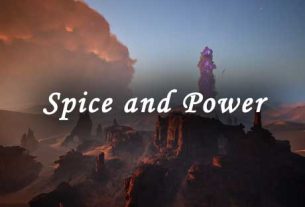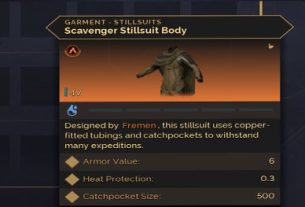Dune: Awakening Specific Terms
These terms are directly related to the game mechanics and lore of Dune: Awakening:
- Anti-Tease Mechanic: A game mechanic designed to prevent players from exploiting the sandworm AI by instantly summoning a sandworm to devour those who try to “tease” it near rocky terrain. This reinforces the sandworms’ formidable presence in the game.
- Cartography: A specialized activity in Dune: Awakening where players scan the Deep Desert to reveal the fog of war and create maps that can be shared or sold to other players. This creates a player-driven economy of information within the game.
- Coriolis Storm: A massive, planet-wide storm on Arrakis known for its destructive power and unpredictable nature. In the game, it acts as a server reset mechanic, occurring on Tuesday nights and reshaping the landscape of the Deep Desert. This adds dynamism to the game world and prevents stagnation.
- Deep Desert: The vast and treacherous open world area of Arrakis, featuring server meshing to connect nine servers seamlessly. This is where high-risk, high-reward activities like spice harvesting and open-world PvP occur. It is a persistent high-level zone designed for endgame players and activities.
- Imperial Permits: Special permits required to craft high-level items in Dune: Awakening. They represent the Imperium’s control and suppression of advanced technology.
- Imperial Testing Stations: Remnants of past research activities on Arrakis, offering unique resources and challenges within a distinct environment. They provide lore insights and gameplay opportunities.
- Landsraad: The governing body of the Great Houses of the Dune universe. In the game, it’s a dynamic, weekly competition where player guilds aligned with major houses compete to influence server rules by earning votes through various tasks and objectives. The faction with the most votes at the end of the week gets to choose a specific server rule for the following week, shaping the gameplay experience for everyone on that server. The developers are considering adding a third, player-controlled faction to the Landsraad system to act as a balancing force and prevent any single faction from dominating the server for extended periods.
- Ornithopter: Flying vehicles used for long-distance travel across the vast deserts of Arrakis. They change the scale and perception of the game world, are essential for spice harvesting, can be used in combat, and might play a role in the Landsraad system.
- Rite of Salvage: A server rule in the Deep Desert that allows any player to loot resources from defeated players, encouraging open-world PvP.
- Slow Blade: A melee weapon in Dune: Awakening, designed to penetrate energy shields. Players must get close to an enemy and perform a slow, deliberate attack to pierce the shield. This mechanic encourages tactical combat and shield management.
- Spice: The most valuable resource on Arrakis, granting special abilities and influencing the political landscape. It is a key ingredient in crafting, can be used for political maneuvering, and is required to complete Landsraad objectives. Players can also consume spice for temporary benefits, but there may be long-term consequences. Harvesting spice is a high-risk activity, often likened to a raid in other MMOs, due to the threat of sandworms.
- Spice Crawler: A specialized vehicle used for harvesting large quantities of spice in the Deep Desert. It requires a team of players working in coordination, with roles such as operating the crawler, flying an ornithopter to transport it, and deploying thumpers to distract sandworms.
- Thumper: A device used to attract sandworms, employed strategically by players for various purposes, including defense, resource gathering, and diverting sandworms during spice harvesting. They act as high-threat targets for sandworms, but players must use them carefully due to their limited lifespan and the potential for attracting worms to unwanted locations.
General MMO Terms
These terms are common in many MMO games and will likely be relevant to Dune: Awakening:
- Archetype/Class: In Dune: Awakening, these represent a player’s background and training, determining their initial starting abilities and talent tree. Players can train in multiple archetypes, creating hybrid builds and expanding their skillsets.
- Crafting System: Allows players to create items like weapons, armor, tools, and consumables using schematics and resources. Dune: Awakening includes both regular and unique schematics, with some requiring Imperial Permits.
- Endgame: Content designed for high-level players after they have completed the main storyline or reached the maximum level. In Dune: Awakening, endgame revolves around the Landsraad, the Deep Desert, spice harvesting, and high-level PvP.
- Faction: A group or organization that players can join, offering unique benefits, quests, and rivalry with other factions. Dune: Awakening features major houses like Atreides and Harkonnen as factions, with a potential third, balancing faction planned.
- Guild: A player-created group that allows players to team up, socialize, and participate in organized activities. Guilds play a significant role in the Landsraad system in Dune: Awakening.
- MMO (Massively Multiplayer Online game): A genre of online games that allows a large number of players to interact with each other in a persistent virtual world. Dune: Awakening falls into the MMO genre, incorporating elements of survival and open-world gameplay.
- Open World: A type of game environment that allows players to freely explore a large, seamless world without artificial barriers or loading screens. The Deep Desert in Dune: Awakening is an open-world zone featuring server meshing to create a vast, interconnected space.
- Progression System: The methods by which players develop and improve their characters over time. Dune: Awakening features a multifaceted progression system that balances gear, skills, and player skill. Players level up, gain ability points to spend on skills and archetypes, unlock crafting schematics, and acquire better equipment.
- PvP (Player versus Player): Gameplay that involves combat between players. Dune: Awakening features open-world PvP in the Deep Desert, with loot rules governed by the “Rite of Salvage.”
- Raid: A challenging, organized activity that typically requires a large group of players to work together to overcome difficult encounters and bosses. Spice harvesting in Dune: Awakening is likened to a raid because of the need for coordination, specialized roles, and strategic planning to succeed against the threat of sandworms.
- Sandworm: Gigantic, predatory creatures inhabiting the deserts of Arrakis, attracted by vibrations. They pose a constant threat to players venturing into the open world, and dying to a sandworm results in the loss of all carried items and equipment.
- Server Meshing: A technology designed to connect multiple servers seamlessly, creating a massive persistent world without instancing or loading screens between different areas. Dune: Awakening utilizes server meshing in the Deep Desert to create a vast and dynamic open-world zone.
- Server Rules: Specific gameplay mechanics that can be active on a server, influencing various aspects of the game. In Dune: Awakening, server rules are determined by the weekly competition in the Landsraad system, with the winning faction dictating a rule for the following week. Examples of server rules include loot rules, crafting costs, and resource availability.
- Survival Game: A genre of games that focuses on player survival in a hostile environment. Dune: Awakening incorporates elements of survival gameplay, including managing resources, crafting, building shelters, and contending with environmental hazards.
By understanding these terms, players will be better equipped to navigate the world of Dune: Awakening and participate in its dynamic and challenging gameplay experience.



